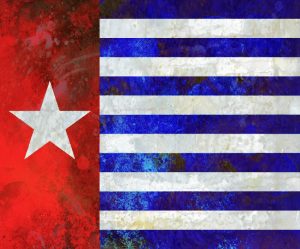Filep Karma, a prominent Papuan pro-independence activist, was found dead on a beach in the Papuan capital of Jayapura yesterday, after apparently drowning during a diving trip.
According to one report, Karma, 63, had been on a diving trip with his brother-in-law and nephew and then went diving alone after his relatives left the trip early. A report from BenarNews stated that there was no reason to believe that his death resulted from foul play. “I followed the post-mortem process, and it was determined that my father died from drowning while diving,” it quoted Filep’s daughter, Andrefina Karma, as saying.
Karma, who was born in Jayapura in 1959, has been a prominent player in the movement for independence from Indonesia, which has taken both violent and non-violent forms since the region’s absorption by Indonesia after a dubious referendum in 1969.
In 1998, Karma was imprisoned after organizing a protest on Biak Island that called for Papuan independence and involved the raising of the Morning Star flag, a symbol of independence banned by Indonesia’s government. He was released the following year.
In 2004, Karma was again arrested after helping organize a ceremony in Jayapura to mark the anniversary of Papua’s independence from the Dutch. The protest-celebration, which also involved the unfurling of the Morning Star, was broken up by police, resulting in clashes with independence activists. Karma was convicted of spreading hatred and of rebellion and sentenced to 15 years in prison and was only released in 2015.
In 2010, the advocacy group Human Rights Watch (HRW) described Karma as “probably one of Papua’s most popular pro-independence leaders,” noting that he “has never advocated violence as a means of obtaining that goal.” As HRW quoted him as saying, “We want to engage in a dignified dialogue with the Indonesian government, a dialogue between two peoples with dignity, and dignity means we have no use of violence.”
This contrasts with the approach taken by the West Papua National Liberation Army (TPNPB in its Indonesian-language acronym), which sees armed struggle as the only way to prevent the encroachment of the Indonesian state. Indeed, over the past few years, as Jakarta drives infrastructure into remoter parts of Papua, with all of the impacts that this has in terms of environmental degradation and transmigration, the TPNPB has launched a series of deadly attacks both on Indonesian military personnel and on workers who are building vital infrastructure such as roads.
The most prominent took place in December 2018, when separatist fighters killed 16 laborers working on the Trans-Papua highway, which runs through densely forested regions of highland Papua. These attacks spurred the further transfer of military units to Papua and crackdowns on local populations, which has in turn prompted separatists to launch more attacks. In a statement earlier this year, U.N. experts claimed that an estimated 60,000 to 100,000 people had been internally displaced in Papua since 2018.
Karma trod a path that avoided the extremes of violent rebellion and acquiescence to what many Papuans view as essentially foreign rule. Whether this approach ever would have achieved Karma’s long-held goal of independence and autonomy for the Papuan people is unclear, but his passing will clearly leave a large vacuum.
“Filep Karma’s humor, integrity, and moral courage was an inspiration to many people,” Andreas Harsono, HRW’s longtime Indonesia researcher, wrote yesterday. “His death is a huge loss, not only for Papuans but for many people across Indonesia who have lost a human rights hero.”
































